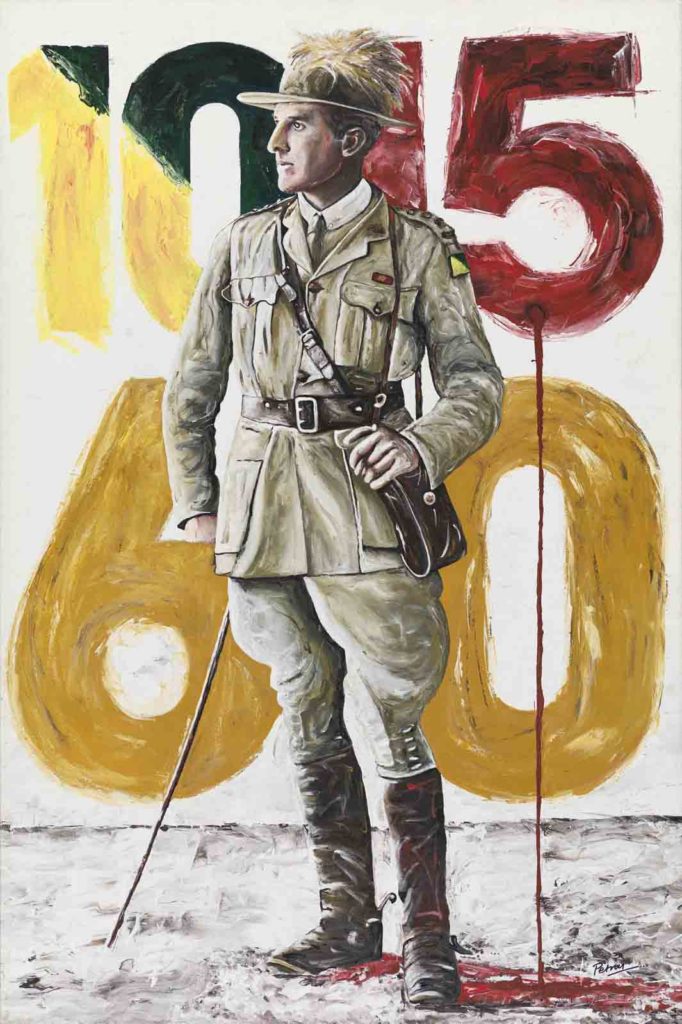Captain Hugo Vivian Hope Throssell
Hugo Vivian Hope Throssell (1884-1933), soldier and farmer, was born on 26 October 1884 at Northam, Western Australia, youngest son of George Throssell, storekeeper and later premier, and his wife Anne, née Morrell, Hugo was one of fourteen children.
With the outbreak of war Hugo and Ric joined the 10th Light Horse Regiment, formed in October 1914. Hugo was commissioned as second lieutenant and remained in Egypt when the 10th was sent to Gallipoli in May 1915. He landed on Gallipoli on 4 August, three days before the charge at the Nek-’that FOOL charge’ as he described it-when 9 officers and 73 men of his regiment were killed within minutes.
At 1 a.m. by moonlight on 29 August the 10th Light Horse was brought into action to take a long trench, 100 yards (91 m) of which was held by Turkish troops on the summit of Hill 60. As a guard, Throssell killed five Turks while his men constructed a barricade across their part of the trench. When a fierce bomb fight began, ‘a kind of tennis over the traverse and sandbags’, Throssell and his soldiers held their bombs on short fuse until the last possible moment before hurling them at the enemy on the other side of the barricade. Throughout the remainder of the night both sides threw more than 3000 bombs, the Western Australians picking up the bombs thrown at them by the Turks and hurling them back. Towards dawn the Turks made three rushes at the Australian trench, but were stopped by showers of bombs and heavy rifle-fire. Throssell, who at one stage was in sole command, was wounded twice. His face covered in blood from bomb splinters in his forehead, he repeatedly yelled encouragement to his men. For his part in the battle Hugo Throssell was awarded the Victoria Cross. It was the first V.C. to be awarded to a Western Australian in the war.
Evacuated to hospital in England, Throssell was promoted captain and joined his regiment in Egypt. He was wounded in April 1917 at the 2nd battle of Gaza where his brother Ric was killed. On the night that Ric disappeared, Hugo crawled across the battlefield under enemy fire, searching in vain for his brother among the dead and dying, and whistling for him with the same signal as they had used when boys.
Throssell married the Australian author Katharine Susannah Prichard whom he had met in England. They settled on a 40-acre (16 ha) mixed farm at Greenmount, near Perth. His wife wrote that those early years of marriage with Hugo, whom she called Jim, were her happiest. When she became a foundation member of the Communist Party of Australia in 1920, Hugo joined her as a speaker supporting unemployed and striking workers. He claimed that the war had made him a socialist and a pacifist. The combination of her award-winning novels and Communism, and his Victoria Cross, brought them fame and notoriety.
Hard times came in the Depression. Katharine believed that her political activities lost Hugo his job with the settlement board, and that his passion to own land led him to borrow recklessly from the banks. He joined the search for gold at Larkinville in the early 1930s. When that proved unsuccessful, he devised a scheme which he hoped would prove a money-spinner. While Katharine was on a six-month visit to Russia, he organized a rodeo on his Greenmount property on a Sunday, not knowing that it was illegal to charge entry fees on the sabbath. The only money Hugo raised from the 2000 people who attended was a meagre silver collection for charity. The episode plunged him further into debt and shattered his optimism.
Imagining that he could better provide for his wife and 11-year-old son if he left them a war service pension, he shot himself on 19 November 1933 at Greenmount. Friends blamed his melancholy on an attack of meningitis at Gallipoli and saw it as the cause of his suicide. He was buried with full military honours in the Anglican section of Karrakatta cemetery, Perth.
In 1954 a memorial to him was unveiled at Greenmount, opposite his home. In 1983 his son Ric presented Hugo’s Victoria Cross to the People for Nuclear Disarmament. The Returned Services League of Australia bought the medal and presented it to the Australian War Memorial, Canberra.


